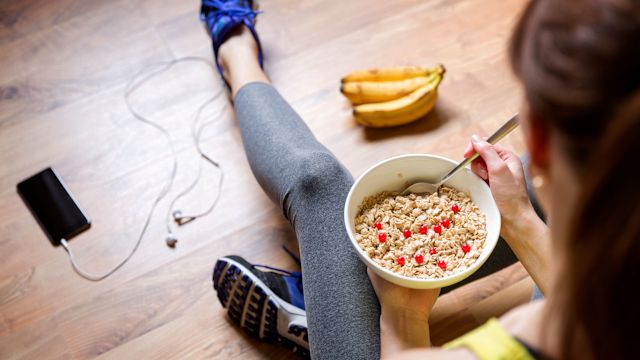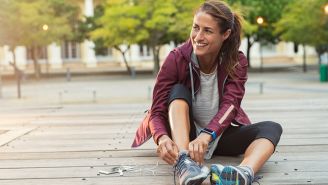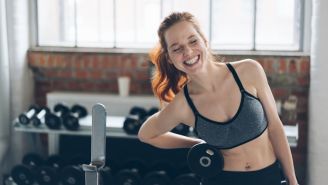Updated on October 21, 2022.
Whether it's a 45-minute aerobics class, an hour of yoga, or a grueling strength-training session, matching your meals to your fitness plan can enhance performance, improve endurance, and lead to a quicker recovery after your workout. But the best foods will vary depending on your body's overall needs and what kind of exercise you'll be performing. Here’s how to make the right choices.
High-intensity exercises: aerobics, interval training, and running
You'll benefit from a mix of carbohydrates. Focus on healthy carbs to sustain your energy and improve endurance during your workouts. Also, eat some lean protein and healthy fats to help repair and maintain your muscle tissue. Make sure you're getting enough calories to keep up with your level of activity while maintaining a healthy weight, as well. Fruit, yogurt, and old-fashioned (non-instant) oatmeal are three good choices. Timing is important too. Try having your snack at least an hour before your workout.
Water needs: You don't need to go overboard with the amount of water you drink, but you do need to make sure you're replacing any water lost through perspiration. The more you lose to sweat, the less efficient your body becomes, and that will affect your performance.
Endurance sports: marathons and triathlons
While you're in training, it's best to eat a balanced, varied diet with plenty of carbohydrates. And don't forget to drink enough water to replace what you lose.
In the two or three days before your event, increase your intake of bread, rice, pasta, cereal, and potatoes, as well as fruits and vegetables. This will help you top off your glycogen stores for the big day. Glycogen is a form of sugar that the body uses to pack away carbohydrates for later use as fuel.
On the evening before your competition, avoid whole-grain, high-fiber, or fatty foods. They take too long to digest.
Water needs: Hydration becomes particularly important during endurance events when dehydration is a possibility, especially in warm weather or at high altitudes. During extreme exercise, water alone may not be enough to replenish the fluids you lose. To help your body use liquids, have a sports drink containing potassium. Sports drinks with electrolytes and carbohydrates can help with hydration while also providing a source of energy.
Resistance or strength training: Pilates and weight lifting
Strength training requires more protein than other exercises, but unless you're an elite athlete, you probably get enough in your everyday diet. That said, some research suggests that when you get your protein may be key in how quickly you amass muscle. Grab a meal with protein right after your workout and you may benefit from a greater increase in muscle mass than if you wait a few hours. Eggs, chicken breast, and salmon are all good choices.
In addition, you'll need an adequate amount of carbs to make it through that final set—think fruit or low-fat yogurt. And don't forget some heart-healthy fats such as nuts or avocado to round out your diet.
Water needs: To avoid painful muscle aches the next day, be sure to replenish any fluids lost. Drink water following your activity.
Flexibility exercises: yoga, tai chi and stretching
Make no mistake: Working on flexibility isn't just about relaxation. Exercises like yoga and tai chi require strength, energy, balance, and mental concentration to get you into and through the various poses.
You'll need a good supply of carbohydrates for stamina, as well as protein and fats to help repair and maintain your muscle tissue. Including omega-3 fatty acids and vitamin C in your diet will also help keep your joints and connective tissue healthy. Nuts, seeds, and cold-water fish, such as salmon and mackerel, are good sources of omega-3 fatty acids, while citrus fruits and leafy greens can provide lots of vitamin C.
Water needs: As with any other type of exercise, your performance will suffer if you are dehydrated, so grab several sips of water before you train. Also, replace fluids lost during your workout to help cut down on post-workout soreness. Unless you are exercising in extremely warm conditions for more than an hour—such as in a heated room for Bikram yoga—plain water should do the trick.
Remember to refuel after your workout
Have you noticed that you often crave sweets or starchy foods after a good workout? That's because your body needs to replenish the glycogen it used. It's important to refuel after a workout, but you should choose the right food.
For about two hours after you exercise, your body is primed for refueling and can replenish its glycogen supplies more quickly than normal, but only if you feed it. So, what's the best aprés-activity treat for your sore muscles? Carbs are good, but a combination of carbohydrates and lean protein is even better for your body's recovery. Together, they help replenish your glycogen stores, and the protein provides important amino acids that work to repair damaged muscle tissue. Think fish with brown rice or peanut butter and banana on a whole-grain wrap.
Serve yourself strong
Sometimes, making time for exercise is difficult enough without having to plan what you'll eat during the day to make your workout more effective. But if you're working on increasing your cardiovascular fitness or improving your strength or flexibility, it's worth the investment. Making just a few small changes to the way you eat can mean the difference between calling it quits or calling "next" on the elliptical trainer. Your body will feel better when you put it to the test, and that will give you your best shot at reaching the finish line.







